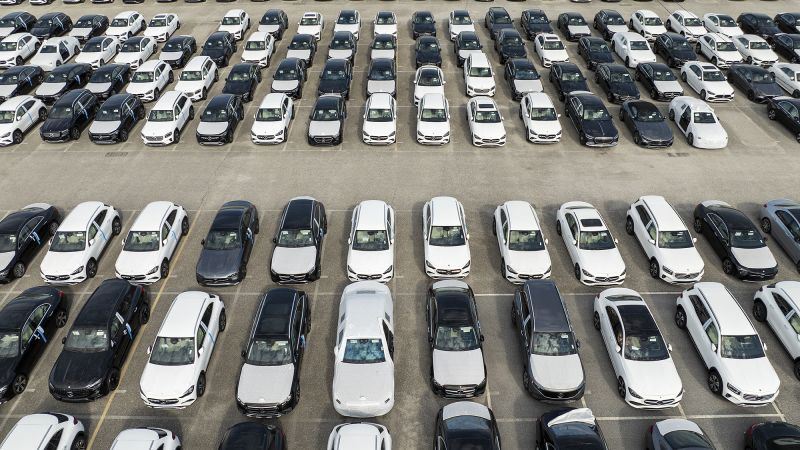New York
CNN
—
President Donald Trump signed an executive order and a proclamation on Tuesday to ease auto tariffs, the latest abrupt shift in a rapidly changing tariff policy that has left businesses scrambling to keep up.
The 25% tariff on imported cars will continue, and a new 25% tariff on auto parts will go into effect this weekend, as previously announced. But there’s some new fine print.
The new actions Trump signed allow reimbursements for domestic car producers importing car parts, which will be subject to 25% tariffs starting May 3. The maximum reimbursement will be 3.75% of the value of domestically produced cars. The cap will decrease to 2.5% for the second year and be phased out entirely thereafter.
At a rally in Michigan to mark the first 100 days of his second term, Trump said the reimbursements would help give US car companies “a little bit of a break” while automakers worked to bring more manufacturing capabilities back to the US.
“They took in parts from all over the world,” Trump said of the auto manufacturers. “I don’t want that. I want them to make their parts here.”
The changes would also shield auto manufacturers from facing multiple auto-related tariffs. Instead, they will only be subject to the highest tariff associated on whatever they’re importing. That means, for instance, they could end up paying a 25% tariff on a car part and not additional 25% tariffs on the steel and aluminum used in them.
Cars containing a combined 85% of parts that comply with the United States-Mexico-Canada Agreement and produced domestically effectively won’t face any tariffs.
However, Trump stressed that the executive order provides only a temporary break to auto companies, allowing them more time to re-shore their manufacturing capabilities.
“We gave them a little time before we slaughter them if they don’t do this,” Trump said.
Kevin Hassett, director of the White House National Economic Council, told CNN’s Kasie Hunt earlier Monday the order was signed while Trump was traveling to Michigan.
“It’s all about getting workers back to work in the places where we make things in America,” Hassett said on “The Arena.”
The decision to ease auto tariffs came as Trump fielded calls from multiple CEOs of automakers, three White House officials familiar with the discussions told CNN. “The president wants to maintain flexibility,” one of the officials, granted anonymity to detail private conversations, told CNN.
Senior Commerce Department officials who previewed the new actions told reporters on Tuesday that those CEOs complained Trump’s steep tariffs would hurt production and hiring in the US.
The auto industry, including carmakers and dealers, has been lobbying for relief from the levies, saying the import taxes will hammer Americans’ finances and snarl their own supply chains.
Last week, a coalition of US and international automakers wrote a letter to the Trump administration asking for relief, similar to exemptions already granted to semiconductors and consumer electronics.
“Tariffs on auto parts will scramble the global automotive supply chain and set off a domino effect that will lead to higher auto prices for consumers, lower sales at dealerships and will make servicing and repairing vehicles both more expensive and less predictable,” the letter read.
“We’re grateful to President Trump for his support of the US automotive industry and the millions of Americans who depend on us,” General Motors’ CEO Mary Barra said in a statement on Monday.
At the same time, GM said it is no longer standing behind its guidance for improved profits in 2025.
“Given the evolving nature of the situation, we believe the future impact of tariffs could be significant, so we are reassessing our guidance and look forward to sharing more when we have greater clarity,” CFO Paul Jacobson told reporters Monday evening. GM is set to release first-quarter earnings results on Thursday, after a two-day delay.
Shares of GM (GM) closed down more than 0.6% Tuesday. Meanwhile, shares of other automakers, including Ford (F), Toyota (TM), Stellantis (STLA) and Honda (HMC) closed higher.
Like GM, Ford and Stellantis thanked Trump for the softer stance on auto tariffs.
“Ford welcomes and appreciates these decisions by President Trump, which will help mitigate the impact of tariffs on automakers, suppliers and consumers,” Ford said Tuesday in a statement to CNN.
“Stellantis appreciates the tariff relief measures decided by President Trump,” the company’s chairman, John Elkann, told CNN in a statement on Tuesday.
Stellantis is scheduled to report its first-quarter earnings on Wednesday, while Ford is set report its earnings on Monday.
This story has been updated with additional reporting and context.

